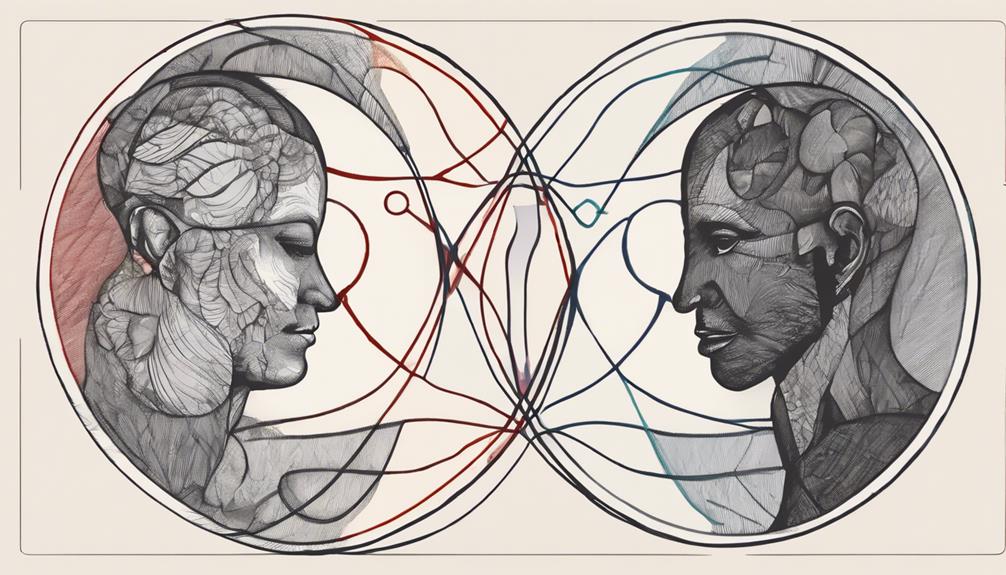Exploring the difference between polyamory and ethical non-monogamy is like traversing various trails in a large forest; each with its own distinct signs and destinations waiting to be discovered.
As we journey into this terrain, we will uncover the nuanced differences between these two relationship styles, shedding light on their underlying principles and practical applications.
Let us unravel the complexities that differentiate polyamory from ethical non-monogamy, offering insights that may reshape our understanding of modern relationship structures.
Key Takeaways
- Polyamory involves loving multiple people romantically, while ethical non-monogamy encompasses all consensual non-monogamous relationships.
- Polyamory focuses on romantic connections, whereas ethical non-monogamy values diverse relationship structures with consent and transparency.
- Polyamory prioritizes deep emotional involvement in multiple romantic relationships, while ethical non-monogamy navigates various relationship styles with open communication.
- Misconceptions arise when equating polyamory with all forms of non-monogamous relationships, highlighting the need to recognize ethical non-monogamy as an umbrella term.
Definition of Polyamory and Ethical Non-Monogamy
When exploring the distinctions between polyamory and ethical non-monogamy, it's crucial to understand the fundamental definitions of these relationship dynamics.
Polyamory involves loving multiple people romantically, emphasizing emotional connections with multiple partners. On the other hand, ethical non-monogamy encompasses all consensual non-monogamous relationships with open communication, extending beyond romantic love to various relationship structures.
In polyamory, individuals may engage in loving more than one person romantically, while ethical non-monogamy allows for sexual openness regardless of relationship status.
Both polyamory and ethical non-monogamy offer avenues for individuals to explore diverse relationship dynamics that involve multiple partners. While polyamory focuses on romantic love, ethical non-monogamy provides space for various forms of connections beyond the romantic realm, including sexual openness.
Understanding these distinctions can help people navigate their relationships, recognizing the different intentions and dynamics within consensual non-monogamous contexts. Ultimately, both polyamory and ethical non-monogamy promote consensual and communicative relationships, offering individuals the freedom to explore intimacy in ways that align with their values and desires.
Key Principles and Values Comparison

Comparing the key principles and values between polyamory and ethical non-monogamy reveals distinct approaches to navigating consensual non-monogamous relationships. Polyamory focuses on loving multiple partners romantically, emphasizing deep emotional connections. On the other hand, ethical non-monogamy encompasses a broader spectrum of consensual non-monogamous relationships beyond just romantic love. It values diverse relationship structures based on consent, transparency, honesty, communication, and respect among partners.
Both polyamory and ethical non-monogamy share common foundational principles. They prioritize open communication, mutual consent, and respect for all parties involved in the relationships. While polyamory specifically centers on loving multiple partners, ethical non-monogamy offers a more inclusive term, acknowledging various relationship dynamics under its umbrella.
Distinctions in Relationship Dynamics
Understanding the nuances in relationship dynamics between polyamory and ethical non-monogamy is essential for individuals navigating consensual non-monogamous relationships. When exploring the distinctions in these relationship structures, it becomes clear that:
- Polyamory is centered around loving multiple people romantically, while ethical non-monogamy encompasses a broader spectrum of consensual non-monogamous relationships.
- Polyamory emphasizes emotional involvement with multiple constant partners, whereas ethical non-monogamy extends to various relationship structures beyond romantic love.
- Ethical non-monogamy includes open relationships, polyfidelity, swinging, and more, offering a diverse range of options compared to the more specific focus of polyamory.
- Polyamory prioritizes romantic connections, while ethical non-monogamy places importance on consent, communication, and respectful navigation of diverse relationship dynamics.
Boundaries and Communication Contrasts

In exploring the nuances of boundaries and communication contrasts between polyamory and ethical non-monogamy, it becomes evident that each approach places distinct emphasis on relationship dynamics and interpersonal interactions. Polyamory prioritizes multiple romantic relationships with deep emotional involvement, often involving intricate boundaries related to emotional connections and relationship hierarchies. On the other hand, ethical non-monogamy encompasses all consensual non-monogamous relationships with a focus on open communication and mutual understanding among all partners. While polyamorous relationships center around romantic commitment to multiple partners, ethical non-monogamy allows for diverse relationship structures beyond just polyamory.
Communication in polyamory revolves around addressing emotional needs and navigating dynamics within multiple relationships, whereas ethical non-monogamy requires open communication to navigate the various relationship styles and boundaries present in such arrangements. Understanding the differences between polyamory and ethical non-monogamy lies in recognizing the emphasis on emotional connections and romantic involvement in polyamory, contrasting with the broader scope of consensual non-monogamous relationships in ethical non-monogamy.
Misconceptions and Clarifications
Let's address common misconceptions and provide clear distinctions between polyamory and ethical non-monogamy to enhance understanding of diverse relationship dynamics.
- Polyamory Emphasizes Romantic Love: Polyamory specifically focuses on romantic love and emotional connections with multiple partners.
- Ethical Non-Monogamy Encompasses Various Styles: It includes open relationships, swinging, and polyfidelity, offering a broader spectrum of relationship dynamics.
- Confusion Around Equating Polyamory with All Forms: Misconceptions arise when people assume polyamory represents all types of ethical non-monogamous relationships, leading to misunderstandings.
- Appreciating the Diversity Under Ethical Non-Monogamy: Recognizing ethical non-monogamy as an umbrella term that encompasses polyamory helps in understanding the nuances and complexities of different non-monogamous relationships.
Frequently Asked Questions
Is Ethical Non-Monogamy the Same as Polyamory?
Yes, ethical non-monogamy isn't the same as polyamory.
While both involve having multiple relationships, polyamory specifically focuses on loving multiple partners romantically.
Ethical non-monogamy, on the other hand, encompasses a wider spectrum of consensual non-monogamous arrangements.
Understanding these distinctions is crucial for navigating relationship dynamics effectively and respecting individual preferences and boundaries.
Why Is Polyamory Ok but Not Polygamy?
Polyamory is often more accepted than polygamy due to its emphasis on consent, equality, and emotional connections.
While polyamory prioritizes honesty and communication among all partners involved, traditional polygamy can raise concerns about power imbalances and lack of autonomy.
Societal views and legal restrictions play a significant role in why polyamory is more widely accepted as ethical non-monogamy compared to polygamy.
Is ENM the Same as Swinging?
Yes, we know that ethical non-monogamy (ENM) isn't the same as swinging. While swinging often revolves around casual sexual encounters with other couples, ENM encompasses a broader spectrum of consensual non-monogamous relationships.
Swinging may focus more on sexual exploration, whereas ENM places a strong emphasis on open communication, honesty, and respect among all partners.
It's about understanding the unique dynamics that make each relationship fulfilling and respectful.
Is There a Difference Between Polygamy and Non-Monogamy?
Sure!
When considering polygamy and non-monogamy, it's crucial to understand that they both involve having multiple partners.
However, polygamy specifically pertains to marriage among multiple partners, whereas non-monogamy encompasses various intimate relationship structures beyond traditional monogamy.
These distinctions are essential in recognizing the unique dynamics and legal implications associated with each practice.
It's important to navigate these complexities with empathy and respect for all individuals involved.
Can you explain the distinction between Polyamory and Ethical Non-Monogamy?
Polyamory vs ethical nonmonogamy differences lie in their approach to relationships. Polyamory involves multiple romantic relationships with the consent of all parties, while ethical non-monogamy is a broader term encompassing various consensual non-monogamous arrangements. Both prioritize honesty, communication, and consent, but polyamory specifically focuses on romantic connections.
Conclusion
In conclusion, while polyamory and ethical non-monogamy are often used interchangeably, there are subtle distinctions between the two concepts.
One interesting statistic to note is that a recent study found that 4-5% of Americans have engaged in some form of consensual non-monogamy.
This highlights the growing acceptance and diversity of relationship styles beyond traditional monogamy, emphasizing the importance of communication, consent, and respect in all types of relationships.
Augustus is the visionary leader and Editor-in-Chief of Personality-Test.net. With an unwavering commitment to quality and authenticity, he oversees all content, ensuring it enlightens and empowers our audience. Augustus believes deeply in the transformative power of self-awareness and is dedicated to making Personality-Test.net a beacon for those on a journey to understand themselves better.










